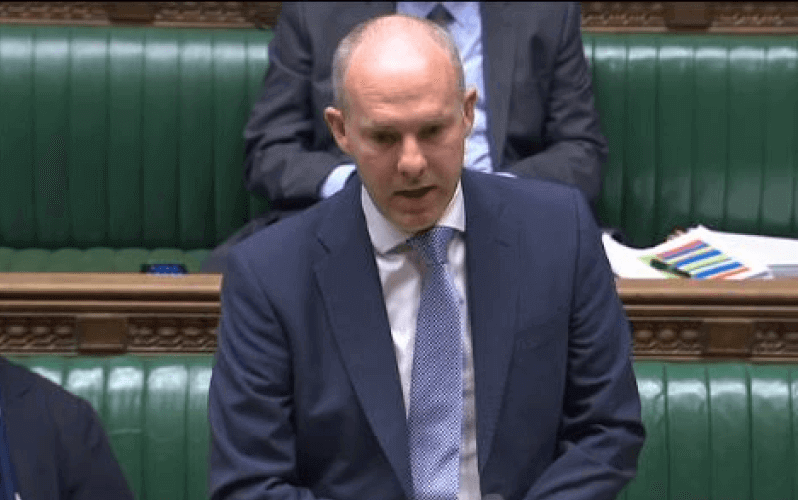The minister for disabled people has refused to provide MPs with any details of government plans to set up an independent panel to examine cases where his department’s failings have led to the deaths of benefit claimants.
The spending round document published by the Treasury on 4 September said the new “independent serious case panel” would aim to improve DWP “safeguarding”.
The Treasury said it would provide funding of £36 million for 2020-21 to fund both the panel and ensure that decision-making on benefit claims was “accurate” and that benefit application processes were “straightforward and accessible”.
But following that announcement, DWP refused to explain why it was setting up the new serious case panel.
Now, a month later, Justin Tomlinson, the minister for disabled people, has been asked about the plans in the House of Commons.
Labour’s shadow minister for disabled people, Marsha de Cordova, told Tomlinson that a catalogue of DWP failings had “created a hostile environment for disabled people”.
And she said: “The announcement of the new independent serious case panel lacks any meaningful detail, terms of reference or purpose.”
De Cordova asked Tomlinson to confirm if the new panel would review previous deaths linked to benefits, and if he would describe the panel’s “statement of purpose”.
But Tomlinson refused to answer the question, telling de Cordova instead (pictured) how DWP worked “all year round with claimants, stakeholders and charities – organisations with real-life experience – to help to improve not only the training but the understanding of all areas of disability and health conditions”, and backed that up with “genuine financial support”.
DWP also refused – again – to answer questions from Disability News Service (DNS) about the serious case panel this week, including whether the new work and pensions secretary Therese Coffey had now ditched the idea.
But de Cordova told DNS: “The government’s announcement of a new independent serious case panel lacks any detail, terms of reference or statement of purpose.
“At DWP [oral questions], the minister failed to give any concrete answer on the nature of the panel, or to confirm whether the panel will examine the DWP’s own failings surrounding social security-related deaths.
“It is of the upmost importance that these questions are answered and that the government are committed to investigating the hostile environment it has created in the DWP.”
If a serious case panel is being set up to examine deaths linked to benefit claims, and other serious cases connected to DWP failings, it would be a significant victory for grassroots disabled activists who have spent years highlighting such tragedies.
It would also be a victory for the Justice for Jodey Whiting petition, backed by grassroots disabled activists and Whiting’s mother Joy Dove, which spent nearly six months highlighting the need for an independent inquiry into deaths caused by DWP’s failings, and secured nearly 55,000 signatures.
DNS has spent more than five years highlighting DWP’s safeguarding failings.
In June, DNS reported how DWP had acted unlawfully by destroying a damaging internal report about its failure to ensure the safety of benefit claimants in jobcentres.
Also in June, the Liverpool Echo reported that Amber Rudd – who has since resigned as work and pensions secretary – had admitted that an internal review into the death of Stephen Smith, from Liverpool, had found that DWP missed “crucial safeguarding opportunities” and had “identified areas where we need to change our policy” to protect claimants in vulnerable situations.
And in February, DNS reported on the Independent Case Examiner report into the death of Jodey Whiting in February 2017, which concluded that DWP failed five times to follow its own safeguarding rules in the weeks leading up to her suicide.
This led to the launch of the Jodey Whiting parliamentary petition, which was set up to press for a criminal investigation into misconduct by ministers and senior civil servants that may have contributed to the deaths of claimants.
A note from the editor:
Please consider making a voluntary financial contribution to support the work of DNS and allow it to continue producing independent, carefully-researched news stories that focus on the lives and rights of disabled people and their user-led organisations.
Please do not contribute if you cannot afford to do so, and please note that DNS is not a charity. It is run and owned by disabled journalist John Pring and has been from its launch in April 2009.
Thank you for anything you can do to support the work of DNS…

 Minister finally admits that working-age benefits spending is stable, despite months of ‘spiralling’ claims
Minister finally admits that working-age benefits spending is stable, despite months of ‘spiralling’ claims Timms says cuts must go ahead, despite being reminded of risk that disabled claimants could die
Timms says cuts must go ahead, despite being reminded of risk that disabled claimants could die Timms misleads MPs on DWP transparency and cover-ups, as he gives evidence on PIP review
Timms misleads MPs on DWP transparency and cover-ups, as he gives evidence on PIP review